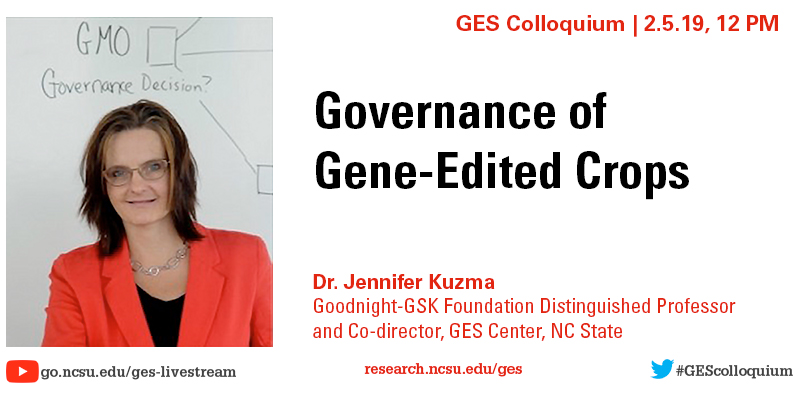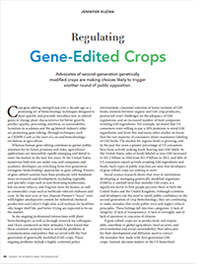
- This event has passed.
GES Colloquium | Jennifer Kuzma – Regulating Gene-Edited Crops

GES Colloquium | YouTube: LIVE STREAM
Governance of Gene-Edited Crops
Speaker:
Dr. Jennifer Kuzma, Goodnight-NCGSK Foundation Distinguished Professor in the School of Public and International Affairs and Co-director of GES Center, NC State University (link)
Abstract:
“Crop gene editing emerged just over a decade ago as a promising set of biotechnology techniques designed to more quickly and precisely introduce new or altered genes to change plant characteristics for better growth, product quality, processing, nutrition, or sustainability. Scientists in academia and the ag-biotech industry alike are promoting gene editing, through techniques such as CRISPR-Cas9, as the start of a second biotechnology revolution in agriculture.”
This article reviews the current state of gene-editing regulation for crops, illuminating the ways in which technology developers are repeating practices that may lead to the public and ethical failures of the first generation genetically engineered crops. Although these developers have expressed desires to do things differently from a public communication and responsibility standpoint, their current oversight and communication practices are 1) obscuring the presence of gene editing on new food labels, 2) marginalizing non-expert stakeholders and publics from providing input, 3) promoting a anti-regulatory stance for gene editing, and 4) hiding behind “science-based” arguments that are inconsistent. The article argues that the contentious socio-political history of genetic engineering will repeat itself for gene editing if these practices continue.
Related publication:
Kuzma, Jennifer. “Regulating Gene-Edited Crops.” Issues in Science and Technology 35, no. 1 (Fall 2018). pp. 80-85. https://issues.org/issue/35-1/
Bio:
Prior to her current role, Dr. Jennifer Kuzma was associate professor of science and technology policy at the University of Minnesota (2003-2013); study director at the National Academies of Sciences, Engineering, and Medicine (1999-2003); and an American Association for the Advancement of Science Risk Policy Fellow at the U.S. Department of Agriculture (1997-1999). She has over 100 scholarly publications on emerging technologies, risk analysis, regulatory policy, and governance and has been studying these areas for over 25 years. She co-founded the Genetic Engineering and Society Center in 2014, and it has since become a leading national and international institution in research, engagement, and education relating to biotechnology and society.
Dr. Kuzma currently serves on the World Economic Forum’s Global Futures Council on Technology, Values, and Policy. She has held several other leadership positions, including a member of the U.S. National Academy of Sciences Committee on Preparing for Future Biotechnology, Society for Risk Analysis (SRA) Council Member and Secretary, Chair of the Gordon Conference on Science & Technology Policy, Member of the U.S. Food and Drug Administration Blood Products Advisory Committee, and a Member of the Food and Agriculture Organization of the United Nations/World Health Organization (FAO/WHO) Expert Group for Nanotechnologies in Food and Agriculture. In 2014, she received the SRA Sigma Xi Distinguished Lecturer Award for recognition of her outstanding contributions to the field of risk analysis and in 2017-2018 she was awarded the Fulbright Canada Research Chair in Science Policy.
She is interviewed frequently in the media for her expertise in biotechnology policy, including the New York Times, Science, Nature, NPR, Washington Post, Scientific American, PBS Nova, Wired, and ABC & NBC News.
